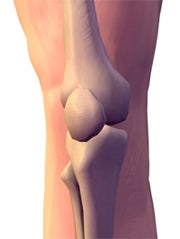Knee Replacement
The knees are generally affected by three types of arthritis: osteoarthritis, rheumatoid arthritis, and post-traumatic arthritis. Pain usually develops gradually, but sudden onset is possible. Joints become stiff and swollen, and pain usually worsens after periods of inactivity or increased activity. You may also feel a sense of “locking” or “buckling” in your knees.

Most people living with osteoarthritis in their knees won’t need surgery. Over-the-counter anti-inflammatory medications can alleviate daily pain. But, in more severe cases, surgery is needed to remove cartilage, repair muscles, or replace the knee. Patients who weigh more are likely to experience more pain from arthritis in their knees.
If you need knee replacement surgery, our orthopaedic surgeons offer procedures that can alleviate pain associated with severe and limited knee arthritis.
In a full knee replacement, our surgeons resurface the damaged knee and insert plastic or metal implants over the ends of the knee and the knee cap. If cartilage must be removed to repair muscle, they perform an arthroscopic procedure that uses tiny cameras to look inside the knee, identify the problem, and fix it using small instruments inserted from several angles around the knee.
In cases of limited knee arthritis, WakeMed orthopaedists offer the minimally-invasive, MRI-guided Oxford® partial knee replacement. This procedure allows our surgeons to replace just one side of the knee, removing up to 75 percent less bone and cartilage. This surgery is less painful, offers quicker recovery times, and maintains a more natural knee motion than a total replacement. Consult your orthopaedist about whether you’re a candidate for this procedure.
What happens after surgery?
Typically, patients will be up and moving the day after surgery, oftentimes with the help of parallel bars or crutches. A physical therapist will suggest a regimen of at-home exercises that will further strengthen the knee, as well as set up a therapy schedule to ensure the best possible post-surgery outcomes.
WakeMed offers one of the most comprehensive Rehabilitation Hospitals in the region and provides both in- and outpatient services around Wake County. Learn more about WakeMed Rehab.